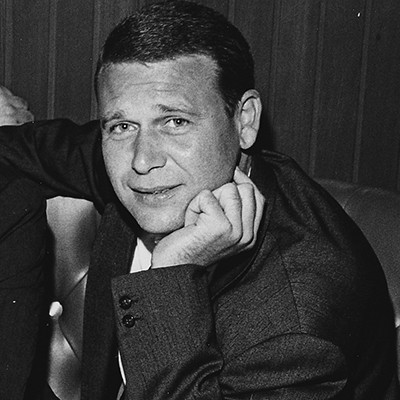
Herbert Rehbein
It has been said that the soft sound of a violin, indeed, the sensibility of a violinist at work, is the thread that runs through all the melodies of Herbert Rehbein. In fact, Rehbein’s contribution to the long-running and successful songwriting partnership with Bert Kaempfert is dominated by this easy-listening trademark.
Born in Hamburg, Germany, in 1922, Rehbein’s first contact with music was through the strings of an inexpensive violin his parents purchased for him instead of the far more expensive piano he had hoped for. Beginning at age nine, he studied and practiced with fervor, concentrating on the violin concerti of the masters, including Brahms, Mendelssohn and Tchaikovsky, to mention a few. But alas, the advent of war in 1941 stepped in to bring his career in classical music to a halt. At the age of 19, he was drafted but he was lucky enough to be assigned to the Music Corps and stationed on the Mediterranean island of Crete, where he had a chance to play music with the local gypsies.
At a later stage of the conflict, he was a prisoner of war in Belgrade, Yugoslavia, for three long years. However, the authorities permitted him his violin and he continued practicing religiously. Eventually, as the war came to a close, he became a hireling rather than a prisoner, when he was named violin soloist and musical director of the Belgrade Radio Orchestra.
Rehbein remained in Yugoslavia until 1952, when his mother’s illness brought him back to his native Germany. During the latter stages of his confinement in Belgrade, and later with the Belgrade Radio Orchestra, his interests had gradually taken a turn toward pop music, especially big band swing, which in the late ’40s was engulfing major sectors of Europe. He became active with German radio orchestras as composer, arranger and violin soloist. During this phase of his career, Rehbein met a fellow German instrumentalist and songwriter, Bert Kaempfert. The two performed a number of engagements together and became friends.
The friendship soon blossomed into a songwriting partnership, and in the early ’60s, the two began co-writing in earnest. They created a kind of “continental” sound that found favor in many countries, including the United States, where Milt Gabler, the artist and repertoire director of Decca Records, helped open many doors for them; the team began to enjoy major international success with their songs.
Frank Sinatra, for example, recorded “Strangers in the Night” into a huge hit. He also recorded a host of others, including “The World We Knew (Over and Over),” “My Way of Life,” “You Turned My World Around,” “Sweet Maria” and “Lady.” Dean Martin recorded “I Can’t Help Remembering You” and “Welcome to My Heart.” Sammy Davis enjoyed a hit with “Lonely Is the Name,” as did A] Martino with “Wiedersehn.”
Rehbein also produced three albums of instrumentals with his own orchestra with all the arrangements emphasizing his characteristic soft string sound. One of the albums, “Music to Soothe the Tiger,” Gabler called “cheek to cheek music, designed to share with someone you love.” In 1972, Rehbein also won the anonymous competition for the Olympic theme song.
In Europe, Rehbein worked with Hermann Prey and Lisa Della Casa, two international opera stars. He lived in Switzerland at this stage of his life where he was musical director of the Swiss Radio Orchestra as well as its violin soloist. In 1955, Rehbein married Ruth Wellstein who became his strongest support throughout his career. He was only 57 when he died of cancer in 1979, bringing an outstandingly successful career to an untimely close.
Licensing with Spirit. License Herbert’s music HERE.


